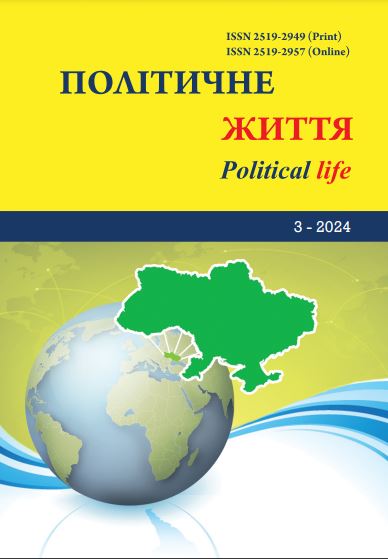Communication activity of authorities
DOI:
https://doi.org/10.31558/2519-2949.2024.3.4Keywords:
communication policy of state authorities, press, communication processes, censorship, freedom of the press, social media, information wars, political communication, propaganda, civil society, digitalization, Internet, cultural and social dimensions, democracy, authoritarianism, political control over mass media, information security, media landscapeAbstract
This article explores the communication activities of government authorities within the context of the development of the information society. It emphasizes that in modern conditions, information and knowledge become key resources that determine the socio-economic, technological, and cultural development of society. The impact of effective political communication on the democratization of power relations is analyzed, highlighting its role in overcoming social contradictions and bridging the gap between citizens and the government. The article discusses the problems that hinder political communication from effectively fulfilling its role, such as bureaucracy, corruption, manipulation of public opinion, and low professionalism of officials. The author also examines theoretical approaches to shaping communication policy, including the theories of the information society and communicative power theory. Special attention is given to the digitalization of communication processes, the implementation of e-government, and the development of social networks as tools for government communication. The importance of information security, press freedom, censorship, and the role of social media and new information and communication technologies in modern democratic society are analyzed. Particular emphasis is placed on the importance of constructive dialogue between the government and society, the need for the development of new skills and competencies among civil servants, and adaptation to the changing conditions of the information environment. The article examines communication barriers such as linguistic differences, information overload, and lack of feedback, and suggests ways to overcome them. Thus, the article concludes that a strategic approach is needed for the development of communication policy by government authorities, which should consider the principles of the information society, ensure sustainable development, and support innovative processes in all areas of public life.
References
Аршевська М.В. Вибір інструментів маркетингових комунікацій на основі комбінації їхніх видів: психологія сприйняття. Вісник Дніпропетровського Університету. Економіка. Дніпро, 2013. №7. С. 73–79.
Бобрук А.М. Методологічні підходи дослідження сутності поняття «політична мімікрія». Вісник Харківського національного університету імені В. Н. Каразіна. Питання політології. Харків, 2012. №15. С. 35–40.
Бокоч Ю. Дослідження політичної комунікації у контексті трансформації суспільства. Науковий часопис НПУ імені М. П. Драгоманова. 2017. № 21. С.21– 27.
Гнатюк О. Л. Основи теорії комунікації: навч. посіб. Київ: КНОРУС, 2017. 256 с.
Денисюк С. Г. Толерантність в просторі політичної комунікації: від теоретичних основ до практичного втілення. Політичний менеджмент. 2011. № 6 (51). С. 20–29.
Дяченко О. Особливості мовно-маніпулятивного впливу за різних типів політичного режиму. Актуальні проблеми політики. Одеса, 2016. С. 29-40
Кельман М. С. Самоорганізація народу як фактор формування громадянського суспільства в Україні: монографія. Львів: Растр-7, 2018. 211 с.
Концептуальний базис політичної комунікації. URL: https://dspace.nlu.edu.ua/bitstream/123456789/1217/1/Polishuk_kom.pdf (дата звернення: 24.07.2024).
Косенко Ю. В. Основи теорії мовної комунікації: навч. посіб. Суми: Сумський державний університет, 2011. 187 с.
Макаренко Л.П. Політична комунікація як визначальна складова демократичної політичної системи. Вісник Київського університету управління і підприємництва. Київ, 2016. № 82. С. 88–94.
Мак-Квейл Д. Теорія масової комунікації: переклади з англ. О. Возьна, Г. Сташків. Львів: Літопис, 2010. 538 с.
Новакова О. В. Динаміка демократичної рецесії в сучасному світі. Науковий часопис НПУ імені М.П. Драгоманова «Політичні науки та методика викладання соціально-політичних дисциплін». 2015. № 16. 2015. Вип. 16. С. 10–16.
Остапенко М. Політична комунікація: теоретичні аспекти дослідження. Політичний менеджмент. 2012. №3. С. 135-144.
Проноза І. Роль політичних комунікацій у сучасному інформаційному просторі. Політикус. 2021. № 3. С. 75–81.
Роль комунікацій в політиці. URL: http://dspace.pdpu.edu.ua/bitstream/123456789/15547/1/Bokhachenko.pdf (дата звернення 12.02.2023).
Рубан Ю. Теоретико-методологічні засади дослідження політичної комунікації. Вісник НАДУ. Політологія і право. Київ, 2012. №2. С.191–198.
Трансформація політичних інститутів України: проблеми теорії і практики: монографія / за ред. М. І. Михальченко. Київ: ІПіЕНД ім. І. Ф. Кураса НАН України, 2016. 440 с.

